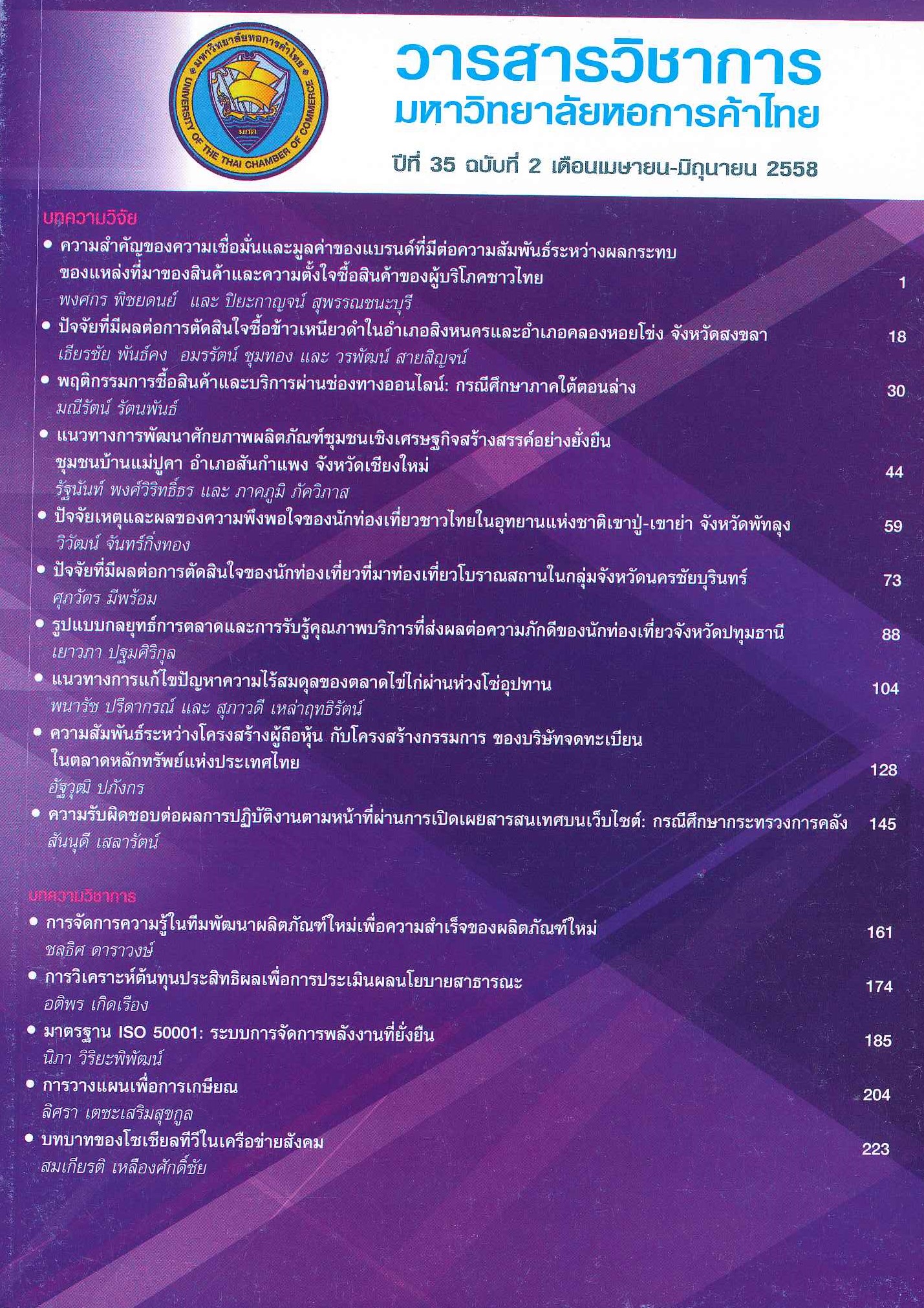Knowledge Management in Product Development Teams for New Product Success
Main Article Content
Abstract
Knowledge management (KM) is an essential tool for product development teams to enhance new product development (NPD) project success. It is clearly seen that team members rely on intensive and ongoing knowledge exchange with one another because they are from a number of NPD-involved functions, such as marketing, research and development, production, and quality control. All individuals are assigned to jointly work on new product projects for a period of time until the project reaches the company’s goals. The objective of this article is to build understanding of knowledge characteristics and knowledge management in NPD teams. However, managing knowledge might face several problems during the development process, such as lack of shared understanding, overreliance on explicit knowledge, repeated mistakes, and loss of tacit knowledge. This information is useful for manufacturing and service firms in order to develop a team’s working system to effectively improve the success of new product projects.
Article Details

This work is licensed under a Creative Commons Attribution-NonCommercial-NoDerivatives 4.0 International License.
ลิขสิทธิ์ของบทความ
ผลงานที่ได้รับการตีพิมพ์ถือเป็นลิขสิทธิ์ของมหาวิทยาลัยหอการค้าไทย ห้ามมิให้นำเนื้อหา ทัศนะ หรือข้อคิดเห็นใด ๆ ของผลงานไปทำซ้ำ ดัดแปลง หรือเผยแพร่ ไม่ว่าทั้งหมดหรือบางส่วนโดยไม่ได้รับอนุญาตเป็นลายลักษณ์อักษรจากมหาวิทยาลัยหอการค้าไทยก่อน
References
Court, Andrew W. 1997. "The Relationship between Information and Personal Knowledge in New Product Development." International Journal of Infornation Managenent 17, 2: 123-138.
Davenport, Thomas H. and Prusak, Laurence.1998. Working Knowledge: How Organizations Manage What They Know. Boston: Harvard Business School Press.
Darawong, Chonlatis. 2012. "New Product and Business Strategy." Sripatum Chonburi Journal 9, 2: 44-52. (in Thai).
ชลธิศ ดาราวงษ์. 2555. "ผลิตภัณฑ์ใหม่และกลยุทธ์ทางธุรกิจ" วารสารวิชาการศรีปทุมชลบุรี 9, 2: 44-52.
Darawong, Chonlatis. 2014a. "Building New Product Development Teams for Thai SMEs in Coping with AEC." Business Administration Journal 37, 1: 22-33. (in Thai).
ชลธิศ ดาราวงษ์. 2557ก. "การสร้างทีมงานพัฒนาผลิตภัณฑ์สำหรับ SMEs ของไทยเพื่อตอบรับ AEC." วารสารบริหารธุรกิจ 37,
1: 22-33.
Darawong, Chonlatis. 2014b. "Enhancing Effectiveness of Cross-Functional Communication in New Product Development Teams." University of the Thai Chamber of Commerce Journal 34, 3: 148-161. (in Thai).
ชลธิศ ดาราวงษ์. 2557ข. "การเพิ่มประสิทธิผลของการสื่อสารข้ามฝ่ายในทีมพัฒนาผลิตภัณฑ์ใหม่." วารสารหอการค้าไทย 34,
3: 148-161.
King, William R. 2009. Knowledge Management and Organizational Learning. New York, NY: Springer.
King, William R. and Lekse, William J. 2006. "Deriving Managerial Benefit from Knowledge Search: A Paradigm Shift?" Information and Management 43, 7: 874-883.
Leonard, Dorothy and Sensiper, Sylvia. 1998. "The Role of Tacit Knowledge in Group Innovation." California Management Review 40, 3: 12-132.
Menon, Tanya and Pfeffer, Jeffrey. 2003. "Valuing Internal Vs. External Knowledge: Explaining the Preference for Outsiders." Management Science 49, 4: 497-513.
Nonaka, lkujiro. 1994. "A Dynamic Theory of Organizational Knowledge Creation." Organization Science 5, 1: 14-37.
Nonaka, lkujiro and Takeuchi, H. 1995. The Knowledge-Creating Company: How Japanese Companies Create the Dynamics of Innovation. New York: Oxford.
O'Dell, Carla and Grayson, C. Jackson. 1998. "If Only We Knew What We Know: Identification and Transfer of Internal Best Practices." California Management Review 40, 3: 154-174.
Parikh, Mihir. 2001. "Knowledge Management Framework for High-Tech Research and Development." Engineering Management Journal 13, 3: 27-33.
Teece, David J. 1998. "Research Directions for Knowledge Management." California Management Review 40, 3: 289-292.


